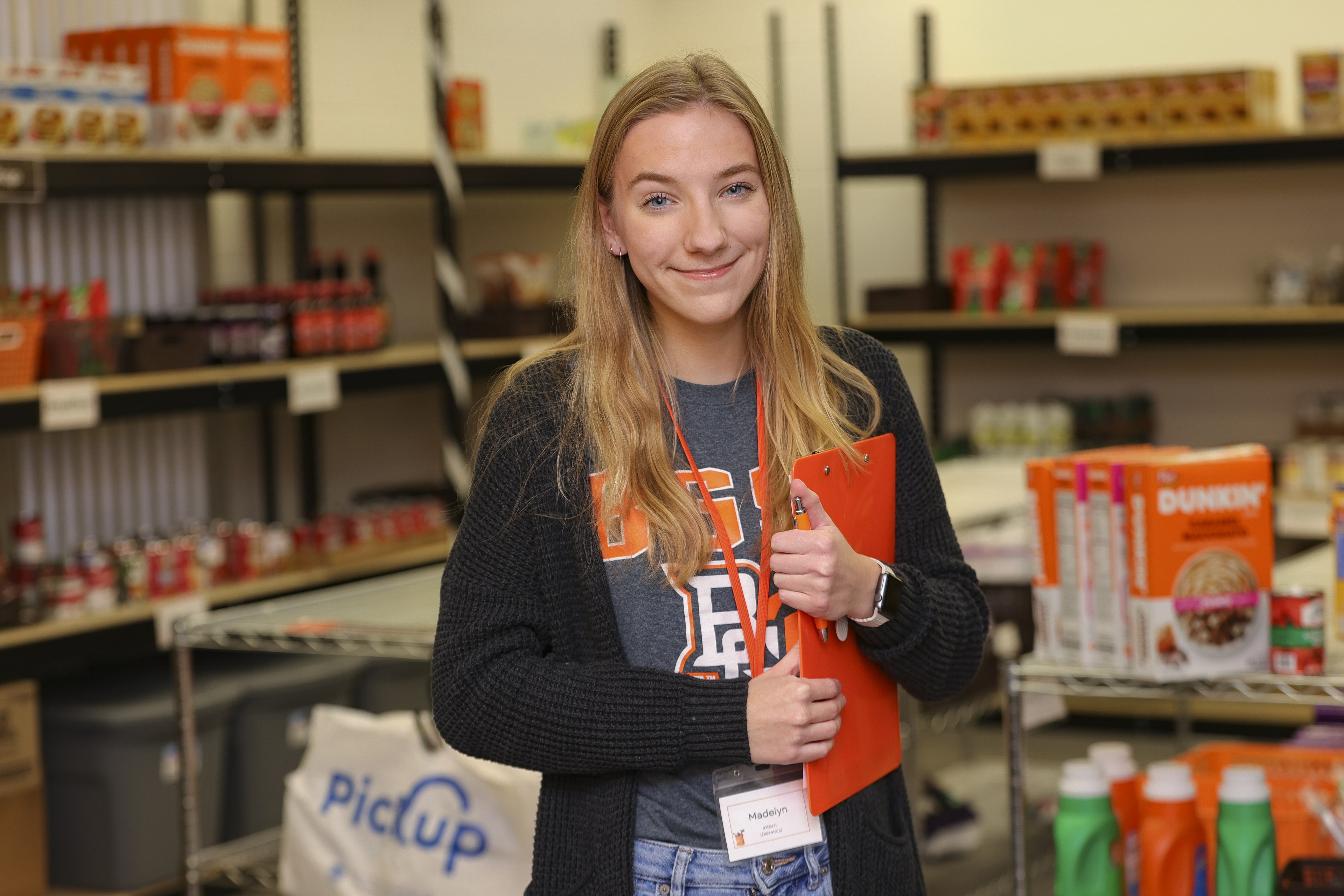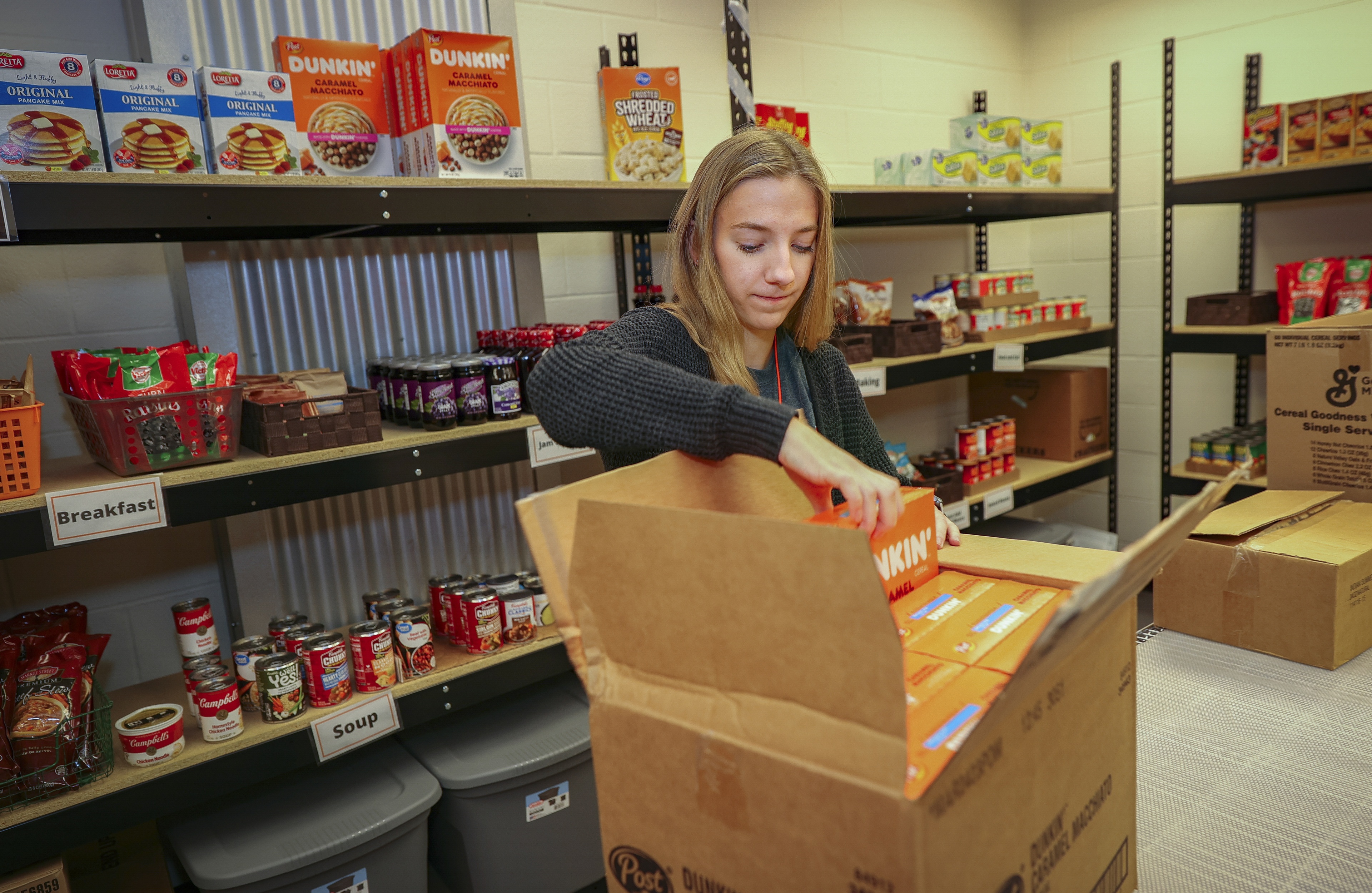
Class of 2022: Dietetics grad inspired to work in nonprofits or public health following internship at Falcon Food Pantry
Madelyn Huzyak’s formative experience led to an interest in food insecurity research, education
By Laren Kowalczyk '07
Madelyn Huzyakc '22 envisioned her life after Bowling Green State University following the seemingly traditional path of a dietetics graduate: providing nutritional care and education in a hospital or clinical setting.
That all changed after Huzyak interned at the Falcon Food Pantry on campus as part of her final capstone Honors College project - an experience so formative she now hopes to work at a nonprofit organization or in public health.
“Working at the food pantry was incredibly rewarding. It has definitely influenced my career plans and opened my eyes to a new path forward. I would love to bring my experience and everything I learned about food insecurity to help create public good in more communities."
Huzyak, who graduated this fall with a bachelor’s degree in dietetics, began interning at the Falcon Food Pantry in the Spring 2022 semester, not long after it opened in January.
Understanding food insecurity
A large part of her capstone project included researching food insecurity on college campuses to understand the need the pantry was fulfilling. She also helped with day-to-day tasks at the pantry like unloading food donation deliveries, stocking shelves and welcoming guests.
“I learned through my research that students tend to put as much money as they can toward school, and their ability to buy food suffers because of that,” she said. “They’re paying for books instead of buying groceries for the week, which is tough to think about. I was unaware of the prevalence of food insecurity at universities until I started this project.”
Dr. Shannon Orr, director of the food pantry and professor of political science at the University, explained that food insecurity on college campuses is not often outwardly apparent but exists.
“Even spending one day at the food pantry, you’ll hear stories of students unexpectedly going through a tough time, a parent losing a job or the struggle of rising food and gas prices,” Orr said.
Huzyak said her interest grew throughout the semester as she witnessed the impact of the food pantry on students. As a result, Huzyak applied for a Center for Undergraduate Research and Scholarship (CURS) grant to conduct additional research and create educational materials for the Falcon Food Pantry over the summer.
As a part of her CURS grant project, Huzyak collected the demographics of pantry clientele and assessed the data. She discovered that the largest percentage of people using the pantry were international and graduate students despite those groups making up a small percentage of the University’s overall student population.
“We have this subconscious idea that if you can afford college, of course, you can afford food too. But that’s not always the case, especially when unexpected expenses occur or something happens in a student's life that causes financial strain.”

Profound experience
In addition to her research, Huzyak developed several educational materials, including informational cards, to promote food items that patrons did not commonly choose.
The Falcon Food Pantry is a client-choice pantry, meaning patrons fill up their own bags of food. Orr said it’s common for people to bypass certain foods due to a lack of familiarity or uncertainty with preparing them.
To help with that issue, Huzyak created laminated cards containing nutritional information and recipe ideas for the five least-selected foods. The cards, which also had QR codes linking to a website with more information, were hung on the shelves beneath the corresponding foods.
Huzyak said within two weeks of posting the informational card next to canned chicken, about 20 cans had left the shelf.
“While there’s no way to know if the card directly contributed to the increased interest in canned chicken, I do think there is a benefit to providing people with nutritional information and recipe ideas for the food that’s available in the pantry,” she said.
Along with the informational cards, Huzyak created flyers on reducing food waste, tips for saving money at the grocery store and sustainable grocery shopping. Huzyak said interning at the food pantry was a defining moment of her undergraduate experience at BGSU.
“I’m so thankful I had this opportunity,” Huzyak said. “The food pantry internship has been a profound part of my undergraduate experience. It’ll be one of the biggest things I’ll reflect on during my time at BGSU.”
Related Stories
Media Contact | Michael Bratton | mbratto@bgsu.edu | 419-372-6349
Updated: 12/12/2022 04:29PM




